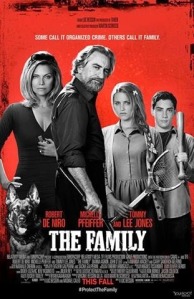
The Family (Sept. 13, 2013)
star. Robert De Niro, Michelle Pfeiffer, Tommy Lee Jones, Dianna Agron, and John D’Leo
From its opening, The Family leads with a very uncertain tone. Straining for hints of dark comedy, the film is most clearly a gangster-action story with the added twist of feigned family drama. Unfortunately, this array of disciplines is never mastered, making for an uneven movie that is sometimes entertaining but never satisfying.
Robert De Niro plays in familiar territory as Giovanni Manzoni, an ex-mafia boss, who has been placed in the witness protection program after disclosing information on his criminal connections and co-conspirators to the FBI. His alias: Fred Blake. He is hidden away in a small, rural town in Normandy with his wife Maggie (Michelle Pfeiffer) and children Belle and Warren (Dianna Agron and John D’Leo), all of whom attempt to assimilate to the local culture while suppressing their overwhelmingly violent instincts. Meanwhile, however, one imprisoned don has his sights set on the revenge of Giovanni, assigning several of his thugs to track down the Blakes and extinguish them.

After a disagreeable diagnosis of the house’s plumbing, Fred (aka Giovanni) seeks brutal revenge on the small-town plumber.
The film’s story most clearly resembles a tale of a family determined to not only stay together, but also to survive a threat to their collective existence. This is more or less realized by the film’s thrilling climax – albeit with much added preposterousness, as the action reaches heights impossible to the reality of a relatively common family. However, the first two-thirds of The Family is preoccupied with instilling this Brooklynite criminal family with quippy wit and a street-savvy edge, depicting their outlandishly sadistic reactions to the rural French folk as comically vengeful or hilariously powerful. Fred is quick to point out he didn’t kill the plumber for his unfavorable assessment… He only put him in a full body cast. And he reminds his wife that she can’t reproach him for this, as she blew up the corner grocery for the owner’s stereotypical assumptions of Americans. Perhaps there is audience attraction in witnessing the punishment of such infringements made by everyday trivialities, but the selfishness upon which they are based does not help our sympathy for the family of characters.

Familial embraces, such as that between Fred and Belle, have little effect and much affectation after so much time and character development spent apart.
Our interest in the Blake family and their story is further problematized by two elements of the story’s structure. First, the majority of the film, intent on fostering a comedy overwhelmed by the gore of the family’s violence, delineates separate plot-lines for the four family members. This may introduce us to their individual characteristics and skills more efficiently, but it isolates the characters and often makes their loving embraces and understandings forced, clichéd, or trite. Furthermore, these plot-lines are relatively listless to the impending danger of the don’s henchmen. Without active, engaging goals uniting Fred, Maggie, Belle, and Warren, the passivity of their (separated) lives is emphasized by the peril that awaits them and approaches too slowly. Luckily, these feeble threads strengthen as they are woven into the climatic showdown, which settles into a more definitive, crime-action tone.
The film’s performances do their part in attempting to pull off the odd blend of violence and wit, the most believable balance of which is provided by De Niro and Pfeiffer. De Niro largely provides more of the same, the Italian crime bosses for which he is iconic; however, there is a fragility and weariness in his portrayal of Fred as a criminal icon ending his run and searching for some final peace that is quite touching. Pfeiffer offers the most charm in the film with an amusing accent and consistency in character that stands in stark contrast to the atonal inconsistencies of The Family itself.


I HAVE to know what you think about the Goodfellas part.
Haha, I thought it was quite clever! I was waiting for the American film to be either “Goodfellas” or “Taxi Driver” as soon as Giovanni received the call with the offer from his neighbor. But I thought this ode to the American crime/gangster film – really a sort of embrace of the visceral excitement and attraction audiences feel towards the genre, as heralded by Giovanni’s commentary – was an example of the film’s finer wit, and an interesting prelude to the more finessed editing and tone of the climax, before events and characters got a bit out of hand.
Although, what I qualify as going over the top (really, I’m speaking here of how quickly the two children can take out an army of mobsters) may be justified by this understanding/depiction of Giovanni’s commentary on the joy of “Goodfellas” and the mafia imagery iconicized in Hollywood filmmaking within that cinémathèque scene.
What did you think of it?
Tone was just too off for me to even laugh at this. Though everybody seemed like they were trying, nobody really seemed to get a chuckle out of me, with the exception of maybe Pfeiffer. Nice review.
Thank you! And I agree. I felt that Pfeiffer’s performance is the only one that manages to hurdle the film’s odd blend of both sentimental family and violent gangster drama with any sense of charm or believability.